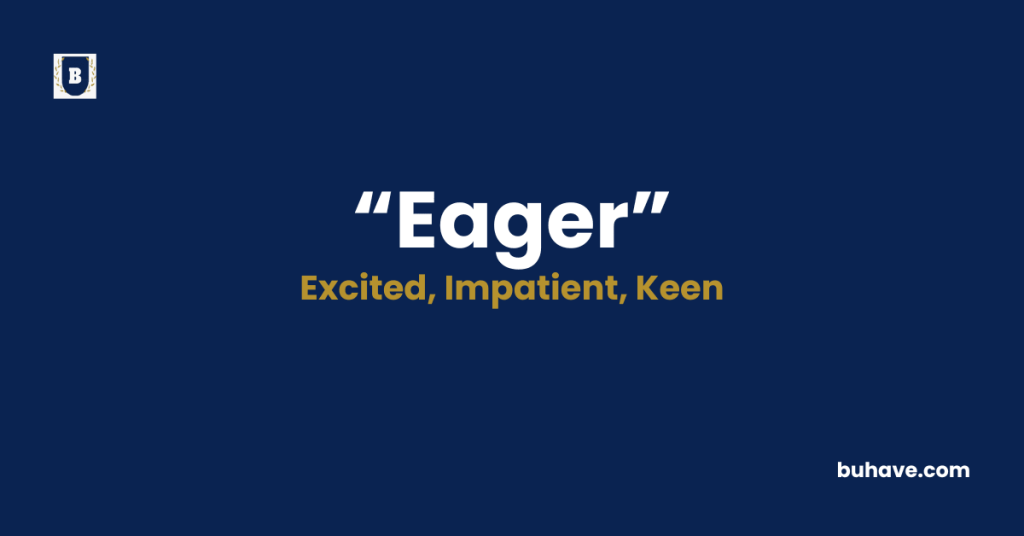The word ‘Eager‘ (Adjective) describes to do something or to have an experience. For starters, the word eager applies to looking forward to an event or task with energy and anticipation. in this guide, you’ll learn the full definition, synonyms, antonyms, etymology, and real-life examples of how to use ‘Eager’ correctly in sentences.
Eager Explained in Depth
A complete and detailed guide to the words Eager including meaning, definition, examples, etymology, synonyms, and antonyms.
Meanings of Eager
One’s eagerness indicates that they possess a strong and excited desire to do something or to have an experience. For starters, the word eager applies to looking forward to an event or task with energy and anticipation. Usually, though, one feels it inside, and it shows in their expression, body language, and tone of voice.
An eager person will not wait passively but will actually take steps since their desire to engage is genuine, and over time, their enthusiasm may even rub off on those around them.
In contemporary times, one can easily spot eagerness among students eager to learn, fans anxious about a concert, or anybody who is just passionate about what comes next.
Definition:
Eagerness is that strong feeling of excitement and desire to have or do something at the earliest possible moment. First off, an eager person would generally have a keen interest in what was coming up next. Often, their enthusiasm is also a strong motivating factor for them to take quick action or voice their hopes. They keep their eyes on the ball and are very much driven, particularly when the task or event in question is of utmost importance to them.
So instead of being passive and waiting, they are very much involved in making the necessary preparations and looking forward to it with excitement. That is why eagerness is an expression of emotional readiness coupled with deep anticipation.
Etymology:
The history of the word eager is very interesting, tracing back to the early European languages. It was first derived from the Middle English eigre, which meant keen or sharp. Language change saw the borrowing of these words into English from either Old French, where wannabe had somewhat the same connotation of sharp or intense, or perhaps Chaucer’s use of it. This line of development can be traced back to the Latin word acer, meaning sharp, fierce, or spirited. It is consequently of interest that the original sense was much more to do with sharpness of feeling or action than with positive anticipation. Over the years, it has been the speakers of English who have diverted this usage toward emotional energy and excitement.
It now means a strong, lively desire as opposed to the harshness of intensity that it first referred to.
Example Sentences:
- She was very much looking forward to starting her new job because it was exactly in line with her interests.
- The children were also running to the playground with great anticipation of trying the new slide they had heard about.
- He had also spent a lot of time studying late into the night and was keen to do well in the final exam the very next day.
- Finally, their eagerness and anticipation were rewarded when the tickets for the concert went on sale.
- These days, young entrepreneurs are still very much eager to innovate and bring new ideas into the world.
Eager Synonyms:
- Enthusiastic
- Excited
- Keen
- Eagerly
- Anxious
- Passionate
- Impatient
- Thrilled
- Energetic
- Willing
Eager Antonyms:
- Indifferent
- Unenthusiastic
- Apathetic
- Reluctant
- Disinterested
- Dispassionate
- Unenthusiastic
- Unwilling
- Reserved
- Calm
FAQs about Eager
Here’s a FAQ-style guide about the word “Eager”
1. What does “eager” mean?
“Eager” is an adjective that describes someone who is:
- Enthusiastically ready or excited for something
- Impatiently or energetically waiting for something to happen
- Keenly interested or motivated
It reflects a positive and anticipatory mindset.
2. How is “eager” used in a sentence?
- “She was eager to start her new job.”
- “The children were eager for recess.”
- “He gave an eager nod of approval.”
3. What are some synonyms for “eager”?
- Excited
- Enthusiastic
- Keen
- Impatient (more neutral/negative)
- Willing
- Thrilled (more emotional)
Each word varies slightly in tone and intensity.
4. Is “eager” a positive word?
Yes. “Eager” usually implies positivity, motivation, and readiness, especially when someone is excited to do something good or helpful.
However, in some contexts, being too eager may suggest:
- Naivety
- Over-enthusiasm
- Impatience
5. What is the noun form of “eager”?
The related noun is eagerness.
Example: “Her eagerness to help was appreciated.”
6. What is the difference between “eager” and “anxious”?
- Eager means excited or enthusiastic about something good.
- Anxious can mean worried or nervous—but it’s sometimes used informally to mean eager (e.g., “I’m anxious to see the results”), which can cause confusion.
Correct example:
- “He’s eager to try skydiving.”
Not recommended (though commonly used): - “He’s anxious to try skydiving.” (Could suggest fear)
7. Can “eager” describe things other than people?
Primarily, “eager” describes people or their reactions.
But it can modify gestures or behaviors as well:
- “An eager smile”
- “An eager response”
- “An eager volunteer”

















